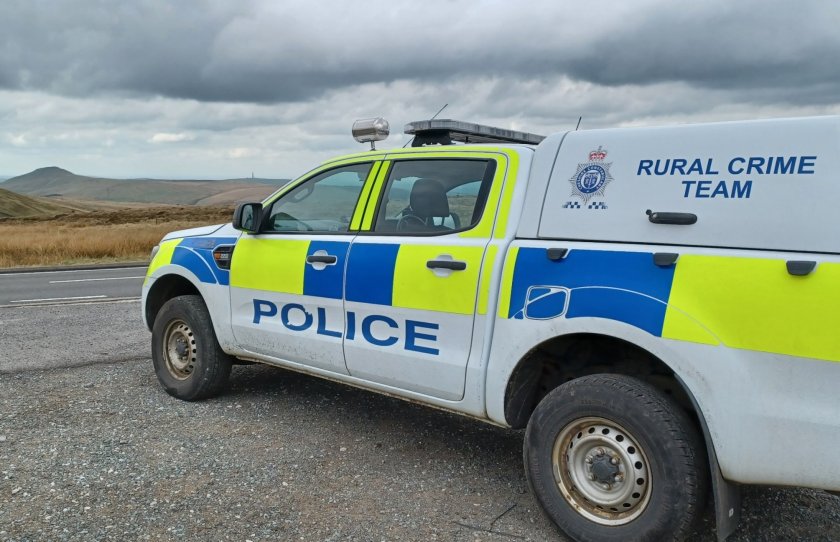
Rural policing is in a 'crisis' after Freedom of Information (FOI) requests have found that many forces have no dedicated rural officers, ringfenced funding or basic kits.
The findings, retrieved by the Country Land and Business Association (CLA), show that five forces have no rural crime team, and eight forces have less than ten dedicated rural officers.
There is also a large disparity in rural crime team funding, with some receiving £900,000 and others just £1,250.
It comes as rural crime rates are surging faster than urban areas, rising 32% since 2011 compared to 24% in towns and cities.
According to the latest figures available by NFU Mutual, rural crime cost the UK £49.5 million in 2022, with the increase in criminal activity significantly impacting farming businesses.
As part of its FOI requests, the CLA approached 36 police forces operating in rural areas across England and Wales. In total, 20 forces responded.
It also found that there is a lack of equipment, including at least three forces without torches, six without ANPR cameras, three without drones, and three with just one drone
Victoria Vyvyan, who is president of the organisation, said the findings showed that the rural policing system was in 'crisis'.
"There’s no serious national coordination, measurement, or even basic kit, to tackle surging rural crime," she said,
“All forces need a rural crime equipment pack, including torches. We can’t expect police officers to tackle crime in the dark."
Cleveland, Derbyshire and Lancashire report no high-powered torches in their inventory, while South Yorkshire have just two high-power torches between 85 officers, and Gwent two across its entire rural crime team.
Six forces including North Wales, Leicestershire, and Northamptonshire are going without critical equipment like mobile ANPR cameras, which allow officers to capture number plates and check them against ‘vehicles of interest’ databases.
Cleveland also have no 4x4 vehicles or rural drone surveillance kits, while three forces including Northamptonshire, Gwent and South Yorkshire have just one drone.
North Wales and Cleveland have no thermal spotters, which allow police to detect criminals in the dark, while three forces including South Yorkshire, Gwent and Derbyshire have just one in their inventory.
Elsewhere, Wiltshire and Cheshire say they are unable to report inventory because the information is not held centrally.
Ms Vyvyan warned that rural crime would remain unseen without proper tagging systems, backed by central funding and coordination.
“People living in the countryside feel treated like second class citizens by law enforcement. They need assurances, in this general election and beyond, that this cannot go on.”
As part of its blueprint for tackling rural crime, the CLA is calling on political parties to issue a standard Rural Crime Equipment Pack to every rural force, alongside training, to be funded centrally and reviewed annually.
Around 90% of Britain’s landmass is rural, yet the body's FOI findings reveal that police forces have either no, or very little, dedicated officers for these areas and their unique types of crime.
Five forces have no dedicated rural officers or rural crime team, including Durham, Nottingham, West Yorkshire, Norfolk and Cleveland.
Where forces do have rural crime units, they represent a small proportion of the overall force. Of those who responded, South Yorkshire has the largest number of rural officers (92), but they make up a small percentage of its force of more than 3,000 officers, despite being a predominantly rural county.
Elsewhere, Leicestershire have just eight dedicated rural officers out of a force of 2,252, while Suffolk have four out of 1,352 officers, and Wiltshire five out of 1,225 officers.
Of the forces who responded, the majority have no policy in place to stop rural officers being pulled into urban issues, or minimum ringfenced resources for rural policing.
Rural crime teams also face a postcode lottery when it comes to funding. While Cambridgeshire has a budget of £961,830, Leicestershire’s rural crime team receives just £1250, and Northamptonshire’s team receives no internal funding.
The CLA said political parties must develop a fixed Service Level Agreement, with appropriate and ringfenced resources, to protect rural communities from crime.
Multiple forces, including Dorset, Wiltshire, Gwent, and North Wales, don’t have tags for tracking common rural crimes including hare coursing, poaching, fly tipping, and GPS and machinery theft.
This means officers must search records manually, limiting their ability to track trends, locate serial offenders, co-ordinate with other forces, and target these crimes effectively.
Of the forces tracking these crimes, they were poorly attended by officers. Leicestershire reported 55 fly-tipping cases in the past year, but only three were attended by officers, while West Yorkshire reported 47 poaching cases, with less than half (22) attended by officers.
Elsewhere, Nottingham say fly-tipping is generally a matter for the council or Environment Agency to investigate, despite being a criminal offence.
Numerous forces are also taking a significant amount of time to respond to 999 calls graded “immediate” – where there is a danger to life or immediate threat of violence.
In rural areas in Nottingham, the average response time is 26 minutes, well over its 20-minute target, while in Leicestershire the average response time is 22 minutes, vs 16 minutes for urban areas.
In Bedfordshire, rural communities are waiting 27 minutes on average for officers to arrive at the scene, while in South Cambridgeshire the median response time is 26 minutes.
